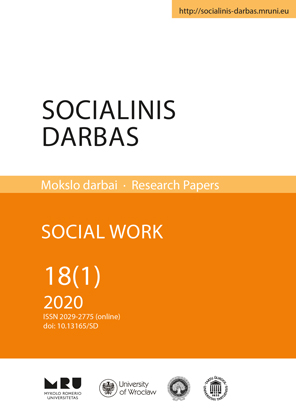SCHOOL CONFLICT MANAGEMENT PROGRAM AS A TOOL TO IMPROVE SCHOOL SOCIAL CLIMATE: LESSONS FOR LITHUANIA
SCHOOL CONFLICT MANAGEMENT PROGRAM AS A TOOL TO IMPROVE SCHOOL SOCIAL CLIMATE: LESSONS FOR LITHUANIA
Author(s): Gražina Čiuladienė, Marius BobocSubject(s): School education
Published by: Mykolas Romeris University
Keywords: conflict management; education; teacher-student relationship;
Summary/Abstract: Constructive conflict management in education setting encompasses recognition that conflicts are part of solutions, and usage of conflicts to enhance the quality of school life, teaching and learning. Contrary, by refusing to acknowledge that conflicts are possibility of solutions and by denying their existence schools might contribute to the development of school climate in which both students and teachers feel damaged. The evidence of unskilled conflict resolution processes in Lithuania’s schools has encouraged search of efforts to be taken by administrators and teachers for becoming more skilful in using constructive conflict procedures.The idea of conflict resolution education is discussed in the article. Conflict resolution education programs are that incorporate effective, nonviolent problem-solving concepts into school wide policies and classroom curricula, teach skills that can be used to implement the positive disciplinary procedures, and conduct conflict management skill building (Batton, 2002). Programs addressing conflict resolution are widely used in U.S. schools as they are viewed as effective tools to decrease violence or/and disruptive behaviours in school settings. The aim of the article is to review School Conflict Management Program implemented in the Ohio State (USA) highlighting peculiarities leading to success. The research question is such as: What are the peculiarities of effective CRE curriculum and its’ implementation?There is a considerable evidence that CRE increases students‘ self-control, communication skills, healthy interpersonal/ inner-group relations. However, conflict resolution education is to be addressed not only students, but as well as administrators, teachers, and parents. CRE training and practice are critical to increasing conflict management skills, and implementing a CRE program is an extremely complex process that demands considerable energy and time from adults involved. The Ohio model as an illustration of a good practice might be helpful in defining CRE, its components and issues of implementation, discussing the feasibility (infrastructure, needed support) in a culturally different context.
Journal: Socialinis darbas
- Issue Year: 18/2020
- Issue No: 1
- Page Range: 38-53
- Page Count: 16
- Language: English

